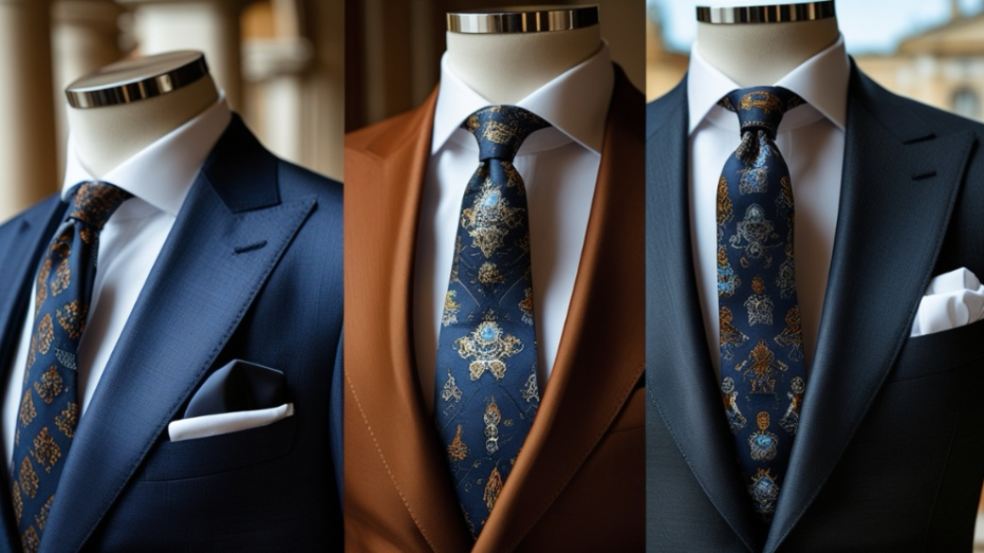
Naples' Sartorial Legacy: Cesare Attolini and Beyond
Naples is famous for its men's tailoring. Three big names stand out: Kiton, Cesare Attolini, and Isaia. These brands show off Naples' skill in making clothes. They each bring something special to Italian menswear. This article looks at how these tailors keep Naples' tradition alive in today's fashion world. We'll explore their history, how they make clothes, and why Naples is so important in men's fashion.
Key Takeaways: Neapolitan Tailoring
- Lightweight structure for comfort in warm climate
- Natural, unpadded shoulders for a relaxed look
- Slim silhouettes that follow the body's contours
- Curved pockets, often called "barchetta" (little boat) style
- Emphasis on handcrafted details and traditional techniques
- Balance between structure and softness in jacket construction
- High armholes for enhanced mobility
- Minimal lining for breathability and comfort
- Distinctive "spalla camicia" or shirt-sleeve shoulder
- Focus on local artisanal production and family-owned businesses
The Cultural Thread — Why Naples Matters in Menswear
History of Neapolitan Tailoring
Neapolitan tailoring started after World War II. Family-owned shops passed down their skills through generations. This focus on craft made Naples a center for great tailoring. The city's tailoring history goes back to the 14th century when a tailors' guild was formed. Over time, Naples developed its own style, influenced by the weather, society, and royal tastes.
The Neapolitan Aesthetic
Neapolitan tailoring is known for being light, having natural shoulders, and slim fits. The curved pockets and soft construction make a unique look that's both stylish and comfy. The "spalla camicia" or shirt-sleeve shoulder is special to Naples. It has a puckered sleeve top that looks like a shirt shoulder, giving more flexibility. Neapolitan tailors also use a "barchetta" or "little boat" style for chest pockets, making a slight curve that adds to the jacket's smooth lines.
Kiton — Tradition Woven with Innovation
History and Philosophy
Ciro Paone started Kiton in 1968. Kiton keeps Italian tailoring traditions while also trying new things. They believe in always making the best clothes possible and getting even better. Kiton started as a fabric trader, which helps them find and make some of the world's best fabrics, like their special 14 micron wool.
Distinct Features and Production
Kiton is famous for using rare and fancy fabrics. They also have their own school to teach tailoring. This helps keep Neapolitan tailoring skills alive, mixing old ways with new designs. The Kiton School of High Sartorial Art, started in 2000, trains young tailors. Each Kiton suit takes up to 25 hours of handwork. Their jackets have soft shoulders with little padding, making them move naturally with your body.
Cesare Attolini — The Father of Soft Tailoring
A House Built on Innovation
Vincenzo Attolini, who started Cesare Attolini, changed stiff British suits into the softer Neapolitan style we know today. This new idea set the foundation for the brand's long-lasting impact on tailoring. In the 1930s, Vincenzo Attolini took out a lot of the stiff parts inside jackets. This made them lighter and more comfortable, which was better for Naples' warm weather. This "deconstructed" style became the main feature of Neapolitan tailoring, influencing not just local tailors but men's fashion worldwide.
Craftsmanship and Identity
Cesare Attolini clothes have soft shoulders, wide lapels, and careful hand-finishing. They stick to traditional methods, making clothes that always look elegant. Their jackets have high armholes for better movement and hand-stitched buttonholes, which show high quality. The company keeps production small, with each piece going through many skilled workers. This ensures top quality and attention to detail that's rare in today's fashion world.
A Modern Legacy
Still run by the family and made locally, Cesare Attolini is a symbol of timeless style in luxury menswear. The brand continues to define classic Neapolitan tailoring with precision and history. Led by Vincenzo's sons, Cesare and Giuseppe, the company has grown while keeping its core values. Attolini focuses on individual style, adapting each garment to the wearer's body and likes. This custom approach, along with their commitment to quality, has earned Cesare Attolini loyal fans among people who love fine tailoring worldwide.
Isaia — Expressive Craft with a Global Twist
History and Brand Character
Isaia started in the 1920s selling fabric, then later made its own clothes. This change from fabric expert to fashion house shaped Isaia's unique approach to menswear. In the 1950s, Enrico Isaia moved the business to Casalnuovo, a town near Naples known for tailoring. Isaia's deep understanding of fabrics, combined with Neapolitan tailoring skills, allowed them to make unique clothes that mixed traditional craftsmanship with modern style. Their coral logo, inspired by Naples' "red coral" good luck charm, shows Isaia's strong connection to its Neapolitan roots.
The Isaia Philosophy
Isaia balances respect for tradition with modern expression, shown by its red coral symbol and bright styling choices. This mix of heritage and new style makes Isaia stand out in Neapolitan tailoring. They're known for using bold colors and patterns, often putting bright checks, stripes, and prints in their designs. Isaia's tailoring keeps the soft construction and comfort of traditional Neapolitan jackets while adding modern elements like slimmer cuts and new fabric mixes. This blend of old and new has helped Isaia appeal to younger, style-conscious customers while still respecting the main principles of Neapolitan tailoring.
International Reach
With shops in major fashion cities, Isaia represents a young and bold take on Neapolitan tailoring that's still deeply rooted in its hometown heritage. The brand's global appeal shows how Neapolitan style is loved worldwide. Isaia has successfully expanded through partnerships and strong presence in key markets like the United States, Japan, and Europe. Despite this global growth, the company still makes its clothes in Naples, ensuring each piece truly represents Neapolitan craftsmanship. Isaia's ability to mix local traditions with global trends has made it a bridge between the rich history of Neapolitan tailoring and modern fashion.
Comparative Heritage: A Look at Craft, Purpose, and Persona
|
Brand |
Founded |
Core Identity |
Style Traits |
Key Differentiator |
|
Kiton |
1968 |
Progressive |
Understated luxury, rare fabrics |
Internal tailoring school |
|
1930 |
Classic |
Soft, flowing construction |
Pioneer of Neapolitan silhouette |
|
|
Isaia |
1920 |
Modern |
Bold patterns, classic lines |
Blend of history and modern flair |
Naples Tailoring in the Modern Era
Adapting Old Techniques to a New Market
Each brand has found unique ways to stay relevant in today's fashion world. Kiton focuses on making fewer, but higher quality clothes. This matches with people's growing interest in sustainable and ethical fashion. Kiton uses the best materials and traditional methods to make clothes that last a long time, appealing to customers who want to invest in good pieces.
Cesare Attolini sticks to timeless elegance, not following trends. By keeping true to traditional Neapolitan tailoring methods, Attolini has become a guardian of tailoring history. This appeals to experts and collectors who appreciate the historical importance and unmatched quality of real Neapolitan tailoring. Attolini's custom services allow for personalization that appeals to clients wanting unique, handmade clothes.
Isaia has developed a strong global image, appealing to younger, style-conscious customers. The brand's use of bright colors and patterns, combined with respect for traditional tailoring, creates a unique mix of old and new. Isaia's marketing often highlights its Neapolitan roots while showing modern styling, helping it attract fashion-forward consumers who appreciate heritage but want modern relevance.
The Sustainability of Craft
Neapolitan tailoring remains popular because it creates long-lasting, high-quality clothes. By supporting local craftsmen and family businesses, these brands help keep traditional skills alive. This focus on craftsmanship matches growing consumer interest in sustainable and ethical fashion. The slow fashion approach of Neapolitan tailoring - using quality materials, skilled handwork, and timeless design - is very different from the fast fashion that's been common in recent years.
Also, by making clothes locally in Naples, these companies have a smaller environmental impact compared to global production chains. They support the local economy and preserve a unique cultural heritage. Customers who care about where their clothes come from and their impact appreciate the clear production processes and direct connection between craftsmen and the final product.
The sustainability of Neapolitan craft goes beyond just environmental concerns. It also includes social and cultural sustainability. By preserving traditional techniques and passing them down through generations, these brands ensure a valuable cultural asset continues. The apprenticeship models and in-house training programs, like Kiton's tailoring school, are crucial in keeping this knowledge alive and providing skilled jobs in the area.
Conclusion
Naples remains the heart of Italian menswear, with Cesare Attolini, Kiton, and Isaia each adding to this rich tradition. These brands show the perfect balance between old and new, craftsmanship and style. As we look ahead, these famous houses continue to grow while staying true to their roots, ensuring that Neapolitan tailoring will keep shaping luxury menswear for years to come.
The ongoing success of Neapolitan tailoring in global fashion shows the timeless appeal of quality, craftsmanship, and cultural authenticity. In a time of mass production and fast fashion, the handmade, personalized approach of Neapolitan tailoring offers a compelling alternative that appeals to discerning customers worldwide. These brands' ability to adapt traditional techniques to modern tastes while keeping their core identities shows how versatile and relevant Neapolitan tailoring is in today's world.
As consumers of luxury fashion, understanding this heritage helps us appreciate the true value of these tailoring masterpieces. Whether it's the soft shoulders of a Cesare Attolini jacket, the rare fabrics of a Kiton suit, or the bold patterns of an Isaia ensemble, each piece tells a story of Naples' lasting influence on men's fashion. The legacy of Neapolitan tailoring, shown by these iconic brands, proves the power of tradition, innovation, and unwavering commitment to quality in creating clothes that are not just garments, but works of art made to last.











